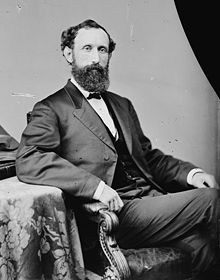William P. Kellogg
William Pitt Kellogg (born December 8, 1830 in Orwell , Vermont , † August 10, 1918 in Washington, DC ) was an American politician and governor of the state of Louisiana from 1873 to 1877 . He also represented his state in both houses of Congress .
Early years and political advancement
William Kellogg attended a private school in Norwich . In 1848 he moved to Peoria , Illinois . There he worked as a teacher while at the same time studying law and was admitted to the bar in 1853. He then moved to Canton to work as a lawyer in his new profession.
At that time he also co-founded the Republican Party in Illinois. At his party's federal convention in 1860, he made friends with Abraham Lincoln . Kellogg became one of its electorates in the following presidential election. After his election victory, Lincoln appointed him Chief Justice in the Nebraska Territory in 1861 . He held this post until 1865. In the meantime, he was a colonel in the Union Army, but soon had to retire from military service for health reasons. On April 13, 1865, the day before his assassination, President Lincoln appointed him head of customs in the port of New Orleans ( Collector of the port ). This certificate of appointment would be Lincoln's last official document in office. Kellogg held this office until 1868.
Senator and Governor
After Louisiana was officially re-admitted to the United States in 1868, Kellogg was posted to the US Senate as a Class 3 Senator . There he represented the interests of his state between July 9, 1868 and November 1, 1872.
In 1872 he applied for the office of governor of Louisiana. His opponent was the Democrat John McEnery . The election was tight and overshadowed by election fraud on both sides. There were two different election committees, each of which declared McEnery and Kellogg the winner. To make matters worse, the incumbent Governor Henry C. Warmoth intervened in the election process in favor of McEnery. Eventually, President Ulysses S. Grant decided that Kellogg had won the election. He had already resigned from his mandate in the US Senate on November 1, 1872. His seat in the Senate initially remained vacant because the occupation of the position in the then politically troubled Louisiana was highly controversial. In 1874 Kellogg's opponents tried to overthrow it by force. The racist White League invaded Louisiana with 5,000 armed men and tried to bring politician John McEnery to power. Kellogg called federal troops for help. In the so-called Battle of Liberty Place ( Battle of Liberty Place ) the power of the insurgents was broken. It cost the lives of around 100 people. It was not until 1876 that James B. Eustis was elected Kellogg's successor. William Kellogg took office as Governor of Louisiana on January 13, 1873. However, McEnery also claimed this post until September 20, 1873. He only gave up after the President's decision on that day. During Kellogg's four-year tenure there was further unrest and rioting in Louisiana. The Democrats accused him of corruption and mismanagement. Impeachment proceedings were initiated against him, but failed in the Louisiana Senate . William Kellogg would remain the last Republican governor of Louisiana until 1980.
Second term as Senator and Congressman
In 1876, despite the hostile mood towards him in Louisiana, Kellogg made it to the US Senate again. As Class 2 Senator , he replaced Joseph R. West . This time, Kellog completed a full six-year term in Congress. He served between March 4, 1877 and March 3, 1883. In the Senate, he was chairman of the railway committee.
In 1882 he renounced another candidacy, the success of which would have been questionable anyway due to the majority in Louisiana. Its seat went to Randall L. Gibson . Between 1883 and 1885 he was a member of the US House of Representatives . After that mandate ended, he retired. He stayed in Washington, where he died in 1918. William Kellogg was married to Mary E. Willis.
Web links
- William Kellog in the National Governors Association (English)
- The governors of Louisiana
- William P. Kellogg in the Biographical Directory of the United States Congress (English)
- William Pitt Kellogg in the database of Find a Grave (English)
- Kurzbiografie (English)
Individual evidence
- ^ Nicholas Lemann, Redemption: The Last Battle of the Civil War. , Farrar, Strauss & Giroux, New York 2006, ISBN 0-374-24855-9 , page 77 (accessed from Google Books on November 21, 2014).
| personal data | |
|---|---|
| SURNAME | Kellogg, William P. |
| ALTERNATIVE NAMES | Kellogg, William Pitt (full name) |
| BRIEF DESCRIPTION | American politician and governor of the state of Louisiana (1873–1877) |
| DATE OF BIRTH | December 8, 1830 |
| PLACE OF BIRTH | Orwell , Vermont |
| DATE OF DEATH | August 10, 1918 |
| Place of death | Washington, DC |



